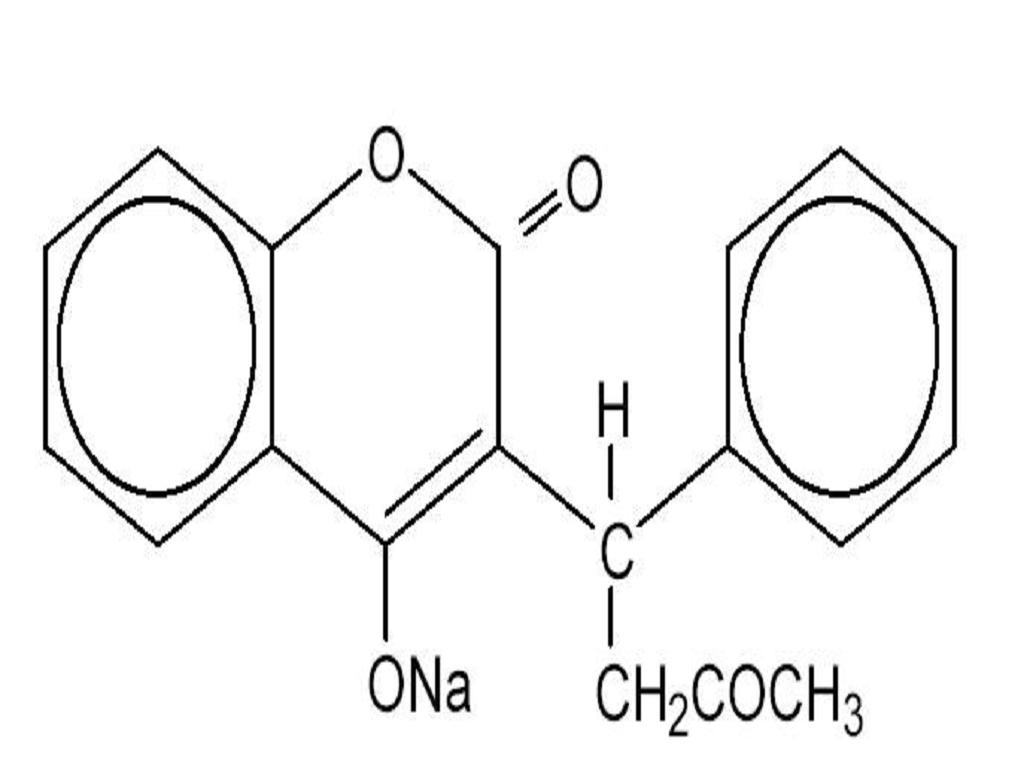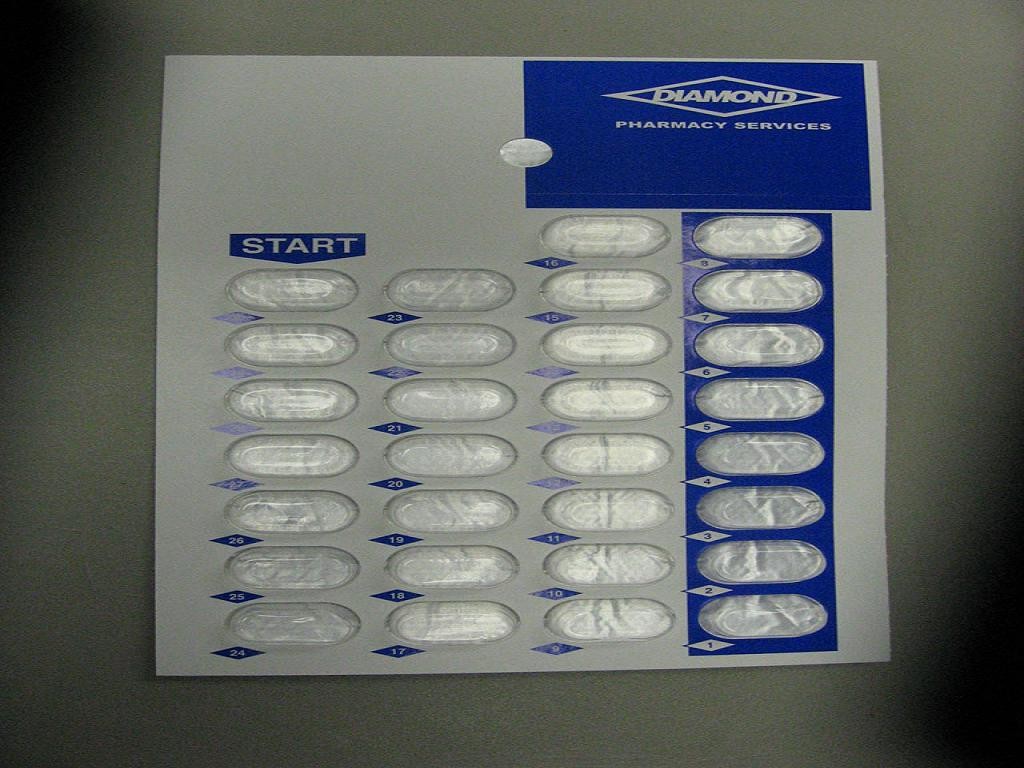Warfarin Sodium
FULL PRESCRIBING INFORMATION: CONTENTS*
- BOXED WARNING
- WARFARIN SODIUM DESCRIPTION
- CLINICAL PHARMACOLOGY
- INDICATIONS & USAGE
- WARFARIN SODIUM CONTRAINDICATIONS
- WARNINGS
- PRECAUTIONS
- INFORMATION FOR PATIENTS
- CARCINOGENESIS & MUTAGENESIS & IMPAIRMENT OF FERTILITY
- PREGNANCY
- PEDIATRIC USE
- GERIATRIC USE
- WARFARIN SODIUM ADVERSE REACTIONS
- OVERDOSAGE
- DOSAGE & ADMINISTRATION
- HOW SUPPLIED
- STORAGE AND HANDLING
- REFERENCES
- SPL MEDGUIDE
- PACKAGE LABEL.PRINCIPAL DISPLAY PANEL SECTION
FULL PRESCRIBING INFORMATION
WARFARIN SODIUM DESCRIPTION

CLINICAL PHARMACOLOGY
Mechanism of Action
Pharmacokinetics
Absorption
Distribution
WARNINGS: Lactation
Metabolism
**
Excretion:
Pharmacogenomics
Elderly
Asians
Renal Dysfunction
Hepatic Dysfunction
CLINICAL TRIALS
Atrial Fibrillation (AF)
Table 2Table 2
*
*
Myocardial Infarction
DOSAGE AND ADMINISTRATION
*
*
Mechanical and Bioprosthetic Heart Valves
INDICATIONS & USAGE
WARFARIN SODIUM CONTRAINDICATIONS
Pregnancy
Hemorrhagic tendencies or blood dyscrasias
Recent or contemplated surgery of
Bleeding tendencies associated with active ulceration or overt bleeding of
Inadequate laboratory facilities
Miscellaneous
WARNINGS
BLACK BOX WARNINGLactation
Severe to moderate hepatic or renal insufficiency
Infectious diseases or disturbances of intestinal flora:
Trauma
Surgery or trauma
Indwelling catheters
Severe to moderate hypertension
Known or suspected deficiency in protein C mediated anticoagulant response
Miscellaneous
PRECAUTIONS
Periodic determination of PT/INR is essentialDOSAGE AND ADMINISTRATIONLaboratory controlCLINICAL PHARMACOLOGYPharmacogenomicsDrug/Drug and Drug/Disease Interactions
It is generally good practice to monitor the patient
Drugs may interact with warfarin sodium tablets through pharmacodynamic or pharmacokinetic mechanisms. Pharmacodynamic mechanisms for drug interactions with warfarin sodium tablets are synergism (impaired hemostasis, reduced clotting factor synthesis), competitive antagonism (vitamin K), and altered physiologic control loop for vitamin K metabolism (hereditary resistance). Pharmacokinetic mechanisms for drug interactions with warfarin sodium tablets are mainly enzyme induction, enzyme inhibition, and reduced plasma protein binding. It is important to note that some drugs may interact by more than one mechanism.
The following factors, alone or in combination, may be responsible for INCREASED PT/INR response:
CONTRAINDICATIONS
Potential drug interactions with warfarin sodium tablets are listed below by drug class and by specific drugs.
*************The following factors, alone or in combination, may be responsible for DECREASED PT/INR response:
Potential drug interactions with warfarin sodium tablets are listed below by drug class and by specific drugs.
*************
Botanical (Herbal) Medicines
-
● Bromelains, danshen, dong quai (Angelica sinensis), garlic, Ginkgo biloba, ginseng, and cranberry products are associated most often with an INCREASE in the effects of warfarin sodium tablets.
-
● Coenzyme Q10 (ubidecarenone) and St. John's wort are associated most often with a DECREASE in the effects of warfarin sodium tablets.
Effect on Other Drugs
Considerations for Increased Bleeding Risk
PRECAUTIONSPharmacokineticsMetabolismDOSAGE AND ADMINISTRATION
INFORMATION FOR PATIENTS
CONTRAINDICATIONSPatients should be informed that all warfarin sodium, USP, products represent the same medication, and should not be taken concomitantly, as overdosage may result.CARCINOGENESIS & MUTAGENESIS & IMPAIRMENT OF FERTILITY
CONTRAINDICATIONSPREGNANCY
CONTRAINDICATIONSPEDIATRIC USE
GERIATRIC USE
CLINICAL PHARMACOLOGYDOSAGE AND ADMINISTRATIONWARFARIN SODIUM ADVERSE REACTIONS
-
● OVERDOSAGE: Treatment).
-
● Bleeding which occurs when the PT/INR is within the therapeutic range warrants diagnostic investigation since it may unmask a previously unsuspected lesion, e.g., tumor, ulcer, etc.
-
● Necrosis of skin and other tissues (seeWARNINGS).
OVERDOSAGE
Signs and SymptomsTreatment
DOSAGE & ADMINISTRATION
Venous Thromboembolism
Atrial Fibrillation
Post-Myocardial Infarction
Mechanical and Bioprosthetic Heart Valves
Recurrent Systemic Embolism and Other Indications
Initial Dosage
-
● Clinical factors including age, race, body weight, sex, concomitant medications, and comorbidities and
-
● Genetic factors (CYP2C9 and VKORC1 genotypes).
*
*
Maintenance
PRECAUTIONS
Duration of Therapy
Missed Dose
LABORATORY CONTROL
PRECAUTIONS
TREATMENT DURING DENTISTRY AND SURGERY
CONVERSION FROM HEPARIN THERAPY
-
● 5 hours after the last IV bolus dose of heparin, or
-
● 4 hours after cessation of a continuous IV infusion of heparin, or
-
● 24 hours after the last subcutaneous heparin injection.
HOW SUPPLIED
STORAGE AND HANDLING
REFERENCES
SPL MEDGUIDE
What is the most important information I should know about warfarin sodium tablets?
-
● Take your warfarin sodium tablets exactly as prescribed to lower the chance of blood clots forming in your body (seeWhat is warfarin sodium?).
-
● Warfarin sodium tablets are very important for your health, but it can cause serious and life-threatening bleeding problems. To benefit from warfarin sodium tablets and also lower your chance for bleeding problems, you must:
-
● Many other medicines, including prescription and non-prescription medicines, vitamins and herbal supplements can interact with warfarin sodium tablets and:
increase warfarin sodium tablets side effects.
Tell your healthcare provider about all the medicines, vitamins and herbal supplements you take. Do not stop medicines or take anything new unless you have talked to your healthcare provider. Keep a list of your medicines with you at all times to show your healthcare provider and pharmacist.
-
● Do not take other medicines that contain warfarin.Warfarin is the active ingredient in warfarin sodium tablets.
-
● Some foods can interact with warfarin sodium and affect your treatment and dose.
Avoid drinking alcohol.
-
● Always tell all of your healthcare providers that you take warfarin sodium tablets.
-
● Wear or carry information that you take warfarin sodium tablets.
What is Warfarin Sodium?
Who should not take warfarin sodium tablets?
-
● your chance of having bleeding problems is higher than the possible benefit of treatment. Your healthcare provider will decide if warfarin sodium tablets are right for you. Talk to your healthcare provider about all of your health conditions.
-
● you are pregnant or plan to become pregnant.Warfarin sodium tablets can cause death or birth defects to an unborn baby. Use effective birth control if you can get pregnant.
-
● you are allergic to warfarin or to anything else in warfarin sodium tablets.
What should I tell my healthcare provider before starting warfarin sodium tablets?
Tell your healthcare provider about all of your health conditions, including if you:
-
● have bleeding problems
-
● fall often
-
● have liver or kidney problems
-
● have high blood pressure
-
● have a heart problem called congestive heart failure
-
● have diabetes
-
● drink alcohol or have problems with alcohol abuse. Alcohol can affect your warfarin sodium dose and should be avoided.
-
● are pregnant or planning to become pregnant.See "Who should not take warfarin sodium tablets?"
-
● are breastfeeding.Warfarin sodium tablets may increase bleeding in your baby.Talk to your doctor about the best way to feed your baby. If you choose to breastfeed while taking warfarin sodium tablets, both you and your baby should be carefully monitored for bleeding problems.
How should I take warfarin sodium tablets?
-
● Take warfarin sodium tablets exactly as prescribed. Your healthcare provider will adjust your dose from time to time depending on your response to warfarin sodium tablets.
-
● You must have regular blood tests and visits with your healthcare provider to monitor your condition.
-
● Take warfarin sodium tablets at the same time every day.You can take warfarin sodium tablets either with food or on an empty stomach.
-
● If you miss a dose of warfarin sodium tablets, call your healthcare provider.Take the dose as soon as possible on the same day. Do not take a double dose of warfarin sodium tablets the next day to make up for a missed dose.
-
● Call your healthcare provider right away if you take too much warfarin sodium tablets.
-
● Call your healthcare provider if you are sick with diarrhea, an infection, or have a fever.
-
● Tell your healthcare provider about any planned surgeries, medical or dental procedures.Your warfarin sodium tablets may have to be stopped for a short time or you may need your dose adjusted.
-
● Call your healthcare provider right away if you fall or injure yourself, especially if you hit your head.Your healthcare provider may need to check you.
What should I avoid while taking warfarin sodium tablets?
-
● Do not start, stop, or change any medicine without talking with your healthcare provider.
-
● Do not make changes in your diet, such as eating large amounts of green, leafy vegetables.
-
● Do not change your weight by dieting, without first checking with your healthcare provider.
-
● Avoid drinking alcohol.
-
● Do not do any activity or sport that may cause a serious injury.
What are the possible side effects of warfarin sodium tablets?
-
● Warfarin sodium is very important for your health, but it can cause serious and life-threatening bleeding problems (see "What is the most important information I should know about warfarin sodium tablets?").
-
● Serious side effects of warfarin sodium tablets also include:
"purple toes syndrome."
Other side effects with warfarin sodium tablets include
Call your doctor for medical advice about side effects. You may report side effects to FDA at 1-800-FDA-1088.
How should I store warfarin sodium tablets?
-
● Store warfarin sodium tablets at 20- 25(68- 77[see USP Controlled Room Temperature]. Protect from light.
-
● Keep warfarin sodium tablets and all medicines out of the reach of children.
General Information about warfarin sodium tablets
PACKAGE LABEL.PRINCIPAL DISPLAY PANEL SECTION


Warfarin SodiumWarfarin Sodium TABLET
| ||||||||||||||||||||||||||||||||||||||||||||||||||||||||||||||||||||||||||||||||
PLEASE, BE CAREFUL!
Be sure to consult your doctor before taking any medication!